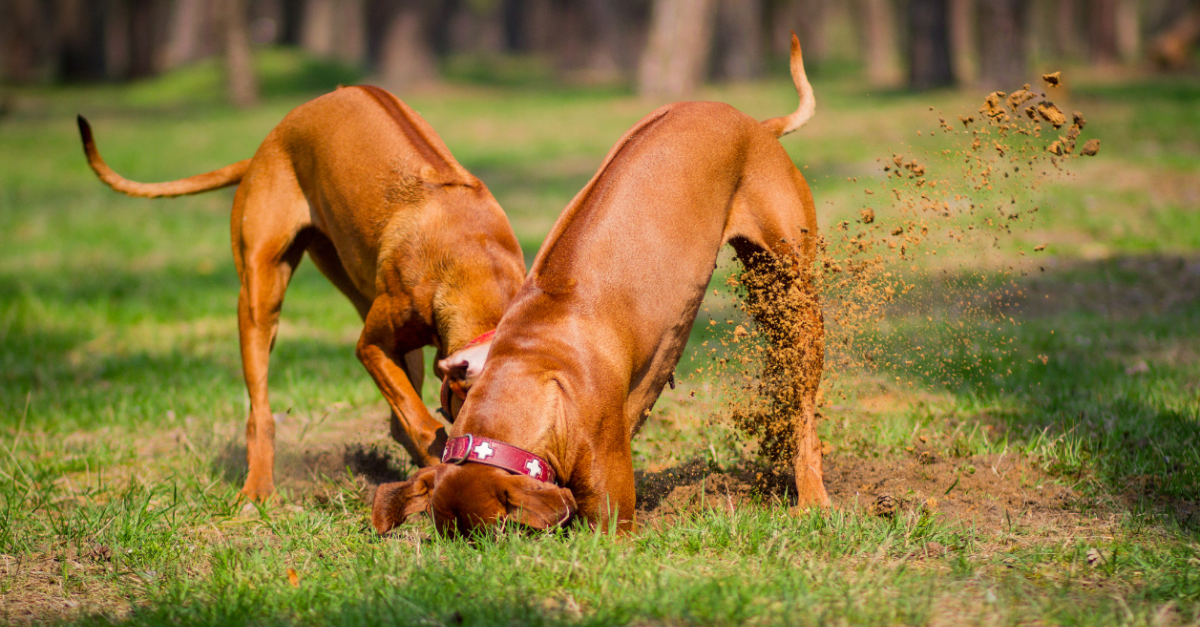How to Stop a Dog From Digging: Expert Training Tips & Prevention Methods

Many of us at SpotOn dabble in gardening, and we know how upsetting it can be to find your hard work undone by hungry critters – whether it’s the work of rascally rabbits or your own beloved pooch! The first step to dog digging prevention is finding the cause behind your pup’s digging behavior. Once you have an idea of where the instinct of the behavior is coming from, you can implement the right deterrents to stop it.
Why Do Dogs Dig?
We reached out to trainer Nicole Skeehan, CPDT-KA, for some insight on why dogs dig & how to stop it.
“I’ve found that many people rely on fences to act as babysitters when it comes to the furry members of their families,” Nicole says. “But dogs are emotional beings that have a LOT of social needs. They need plenty of interaction, especially if they don’t have another canine family member to spend time with.”
It turns out, a dog without enough interaction can get into mischief!
“When a dog isn’t getting their other needs met, they’ll start to show increased reactivity to stimuli outside of the fence, start to dig more, and even attempt to flee completely,” Nicole continues. “I know from first-hand experience with my dogs, Uluru and Porter, that boredom breeds destruction. I’ve got herding dogs, and if I didn’t train them and walk them regularly, no amount of time in our yard is going to stop them from using their smart brains to get into mayhem.”
Dog Digging Prevention Methods
If you’ve exhausted all your options and your beloved pup is still digging – don’t worry, there are still a few other things you can try. Here are some of Nicole’s dog digging prevention recommendations based on what kind of trouble your pup is getting into:
How to Stop a Dog from Digging Holes in Your Yard
If you're like many homeowners, the joy of owning a dog comes with the frustration of dealing with their digging tendencies. Those seemingly innocent and playful digs can quickly transform your once-pristine outdoor space into a minefield of eyesores and tripping hazards. Whether it's your beautifully manicured lawn or newly planted vegetable garden, the aftermath of a determined dog's digging endeavors can leave you feeling defeated. It's time to put an end to the chaos and take back control of your backyard, ensuring both your dog's happiness and the safety and aesthetics of your property.
When your dog engages in seemingly random digging across your yard, it's crucial to recognize that this behavior is often driven by boredom or anxiety, rather than mere curiosity. Your dog might be seeking an outlet for pent-up energy or attempting to alleviate feelings of restlessness. Rather than resorting to deterrents that only address the symptom, it's essential to tackle the root cause.
Outdoor enrichment can go a long way in squashing their boredom and redirecting your dog's behavior towards more constructive and mentally stimulating endeavors. By providing engaging challenges, interactive toys, and opportunities for physical and mental exercise, you can help your dog find fulfillment and contentment, ultimately curbing the urge to dig and creating a better coexistence between your pet and your outdoor space.
Here are some tips to help you stop your dog from digging holes in your yard:
Add a sandbox. Grab a kid’s sandbox or baby pool (these are a little easier to find after the panic of the quarantine has died down and the weather cools), and dump a whole bunch of sand in it. You can also hide their toys in the sand for them to find.
TIP: You may have to help them the first few times to encourage digging in the sandbox. Dogs can struggle with object permanence, so help them dig up their toy and show them that fun things happen in the sandbox.
Change the habitat. If your dog is struggling to be happy in the yard, then change their life in the yard. Give them something to do. Play hide-and-seek, or plant treats around the yard so they can sniff them out and find them. (One of my trainers calls this a sniffari.) Let them use their nose and engage with the yard in a different way.
TIP: If your dog is struggling to find the treats, help them with some problem-solving. Teach them a solid sit-stay, and show them where you’re hiding the treat first. Release them to go find it. Pick the same spots every time so you can ultimately hide quite a few treats without your dog seeing before releasing them to hunt. Check out our guide to dog-friendly backyard upgrades for more ways to make it fun for your pup.
Spend time out in the yard with your dog. If your dog has built up an association that going into the backyard means leaving you, then they may develop digging as a coping mechanism. Spend time out there with him to build up more positive associations with the backyard.
How to Stop a Dog from Digging up Plants or Flowers
Witnessing your pet wreak havoc on your plants or flower beds is disappointing and can undermine the fulfillment you should derive from all the effort you poured into making your garden grow.
Curiosity drives a dog's inclination to dig in plants, a behavior that, if left unchecked, can escalate into a potential health hazard. The disturbed soil can expose roots, disrupt delicate ecosystems, and even unearth toxic substances for dogs.
Introducing well-targeted deterrents can help discourage digging, while guiding your dog towards safer activities. Here are a few common tactics:
Lay down some chicken wire. For our compulsive diggers, new mulch and dirt are especially exciting. Before you mulch, put down some chicken wire to keep your dog out of the garden, since dogs will usually stop when they hit the metal.
Add a keep out zone. With SpotOn GPS Fence, you can create off-limits areas within your virtual fence boundaries. By creating a Keep Out Zone around your garden, you can train your dog to understand that the alerts and warnings issued by the collar and naturally guide them away from this no-go zone.
Utilize pet-safe repellents. Apply commercial or homemade pet-safe repellents, such as vinegar, citrus sprays, or diluted essential oils, around the garden area to discourage dogs from approaching and digging.
Employ physical barriers. Erect low fences, chicken wire, or decorative lattice panels around your garden beds to create a barrier that deters dogs from entering and digging.
Elevate planters. Place your plants in elevated planters or hanging baskets to keep them out of reach of curious paws, ensuring your garden remains untouched.
Apply textures dogs dislike. Cover the soil surface with materials dogs find uncomfortable to dig in, such as rocks, gravel, or rough mulch, discouraging them from engaging in this behavior.
Supervise and intervene. Monitor your dog's behavior in the garden and intervene promptly if you catch them digging. Use a firm "no" and guide them away from the area.
How to Stop a Dog from Digging Under the Fence
This all-too-common scenario not only disrupts your peace of mind but also poses serious dangers and safety risks that demand immediate attention. Addressing the issue of dogs digging under fences is essential to ensuring your pet's well-being and preventing potential mishaps.
he implications of dogs digging under fences extend far beyond mere inconvenience. Your dog could get exposed to a range of hazards, including traffic accidents, encounters with other violent animals, or even getting lost. Additionally, their escape might lead to conflicts with neighbors or legal issues, adding another layer of stress to the already distressing situation. It's clear that curbing this behavior is not just about maintaining the integrity of your property but safeguarding your pet's life and well-being.
Fortunately, there are effective strategies to address your dog's escape artist tendencies. Consider investing in GPS system like the SpotOn Fence to create virtual boundaries without the need for physical fences. For a more traditional approach, utilizing large rocks or landscape edging along the perimeter can create an obstacle that discourages digging. Extending the fence's depth by burying chicken wire beneath the soil is another proven method to thwart escape attempts. By implementing these preventative measures, you not only protect your dog from potential harm but also grant yourself the peace of mind that comes with a safely enclosed yard.
Understanding and addressing dog digging behavior is important for the well-being of your canine companions and the beauty of your backyard! By accounting for the emotional needs of your dog and providing them with the right mental and physical enrichment, you can effectively tackle the root causes of digging and stop the behavior for good.
Want to take the next step in creating a secure and stimulating environment for your pup? Discover a new world of possibilities for your dog’s enrichment and exploration with the SpotOn GPS Fence.
NICOLE SKEEHAN
Philly Unleashed
Nicole has a long background in animal welfare and dog training. Her training career began in college where she taught equestrian and horseback riding. After graduating from Robert Morris University, she worked at a boarding kennel as head trainer and obedience instructor and earned her CPDT-KA (Certified Professional Dog Trainer) title.
Nicole currently owns and operates Philly Unleashed (www.phillyunleashed.com), a dog training studio that provides group and private lessons and behavior modification to the Philadelphia metro area. She continues to work in the field of animal rescue by contracting with shelters to build behavior programming. She also instructs the shelter behavior residency for the University of Pennsylvania’s School of Veterinary Medicine.




